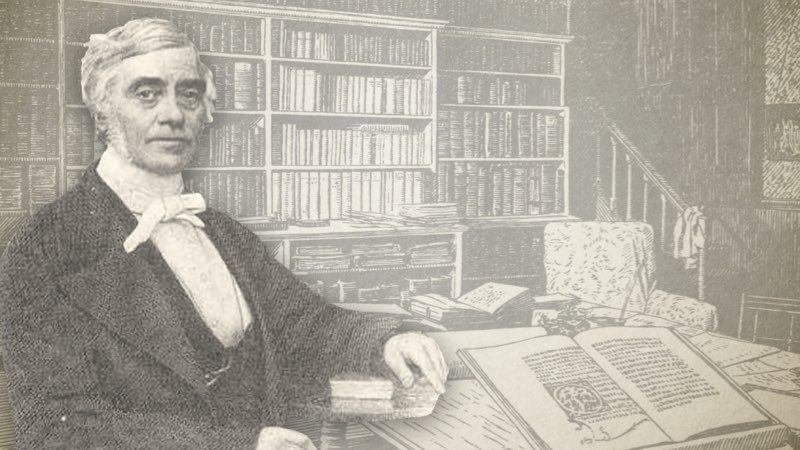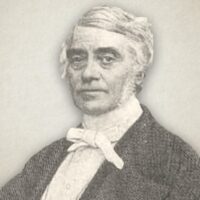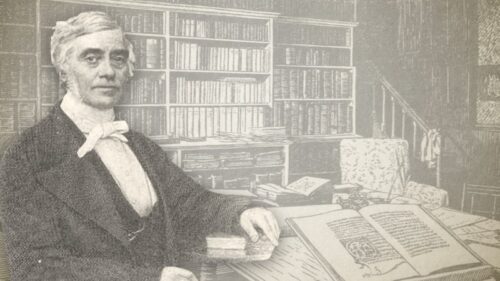
Feeling I Have No Grace Or Religion
October 1, 1834.
My dear Tiptaft,—I have been kept from writing to you, sometimes from occupation, sometimes from sloth, and sometimes from the feeling that I could write nothing profitable. Every day, indeed, I seem to see more and more that I have little or no grace. And at these times, when I can draw to the throne of grace and ask the Lord to work in and upon my soul, I seem to have less grace than ever. At such times, and I have been occasionally favored with a little earnestness, I feel everything in me so shallow, so unreal, so little like the mighty work of the Spirit on the soul. The fountains of the great deep are not broken up, and all my religion seems to consist in a little natural light, just as I know any point of history or language. These are my best seasons, at least in private, when, feeling I have no grace or religion, I ask the Lord to work on my soul. At other times, what with the workings of infidelity, unbelief, carelessness, pride, evil temper, and conceit, with all the silly, foolish, filthy, lustful imaginations which crowd in one upon another, my soul seems like the great deep, “without form and void” (in the original, “confusion and emptiness”, before the word of God said “Let there be light.”
In my ministry, if I am shut up and cannot come forth, I care more for my own failure than the lack of profit to the people. And if I am favored with a little liberty, my proud heart takes all the glory, and gives none to God. So that what can you expect profitable to read from so silly and graceless, so earthly and carnal, a creature as I am? When I am in my right mind I would gladly feel something—law or gospel, conviction or consolations, cries or praises; anything of God would seem better than my present dark, blind, earthly, graceless state. I feel I shall run on so to perdition, unless sovereign grace interpose, and lift me up out of this fearful state. And yet at times only do I feel this, and at other times am as careless as if all was a fable from beginning to end. And then infidelity, with all its subtle doubts and questions, will creep in, and turn my prayers into mockeries. Your heart, I dare say, will echo all this; but what evidence is that to me? I shall perish in my carnal state unless sovereign grace steps in; and from that nothing can shake me. But I will not detail any more of my complaints. Only picture to yourself the proudest, hardest, most unbelieving and carnal person you can—and you have my picture.
I enjoy the Pinnells being so near very much. I have seen them quite often, and we always speak on the best things.
I scarcely expected by this time to have been curate here, as the bishop wrote to me about five weeks ago, reprimanding me for having had an assistant so long without his permission, and requesting an immediate answer, if I was able or willing to resume the whole duty immediately. I answered him very concisely, neither calling him “My Lord” nor “Right Reverend,” and, after having stated a few particulars, said I could not dispense with an assistant. Of course, I expected to hear, in reply, of his intention to remove me; but no such answer has come, nor indeed any answer at all. I committed the affair to the Lord, and as fully expected to be turned out, and return to Abingdon. But here I still am, unmolested.
Clamp and three others walked over here on Lord’s-day. I had much conversation with Clamp, and felt my soul refreshed, and found a union with him. On Sunday, 14th, I preached at Kennington, and was favored with some little liberty—at least, as far as I felt myself. G— was there, who seems awfully departed from the narrow way; and though I knew nothing of the circumstance at the time, I have been told that the sermon fitted him exactly. But so it is. We can hear so well for others, and never hear for ourselves. Mr. Clowes has been down at Wallingford, and is coming again for three weeks, so that we shall see him. I feel much union with, and regard for him. Jones, Mr. P—’s butler, a man of some light, though little grace, heard Gadsby at Gower Street. He described the congregation as excessive, and mentioned, though not to me, an expression of Gadsby—”There is enough filth in the hearts of the people here to make the very walls stench.” His subject was Isa. 63, but this was said in explaining Zech. 3:3, 4.
A notion has got abroad that in your new edition of “Gadsby’s Hymns” you mean to leave out all the experimental ones adapted to peculiar metres. This I have contradicted.
The Miss G—s are come to live here. They contend for the inward power of religion, and have been led to see P—’s “wood, hay, stubble.” Much, however, still remains to come down. They speak of his ministry as powerless, and of his people as dead. He used to call on them about once a week, and never once talked on the things of God. I tried to bring his people to a point, but they seem to me like stones. If we are dark and dead, we know it; but they seem satisfied with their ignorance, and much like the Laodiceans of old. Tysdale preached the charity sermons for me, but did not, I hear, enter very deeply into the mystery of iniquity or the mystery of godliness. S— has been here lately. I liked him much. He has gone through Lam. 3 since we saw him, and spoke much of his dark paths. I took him to the Pinnells, who were much pleased with him, and were very kind to him. Pray come over soon after you arrive. I fear this letter will only carnalize you.
Kind regards to Mr. and Mrs. Keal.
Yours affectionately in Christ,
J. C. P.
Joseph Philpot (1802-1869) was a Strict and Particular Baptist preacher. In 1838 he was appointed the Pastor of the Churches at Oakham and Stamford, during which time he became acquainted with the Gospel Standard. In 1849, he was appointed the Editor for the Gospel Standard Magazine, a position he held for twenty-nine years (nine years as joint Editor and twenty years as sole Editor). John Hazelton wrote of him—
“A man of great grace, profound learning, and with a literary style equal to any of his contemporaries. For twenty years he was editor of the "Gospel Standard," in which his New Year's Addresses, Meditations, Reviews, and Answers to Correspondents were outstanding features. His ten volumes of sermons, entitled "The Gospel Pulpit," and his four volumes of "Early Sermons," testify to his powers as an expositor of the Word, to the beauty of his illustrations, and the heart-searching character of his ministry. He was born at Ripple, Kent, where his father was rector, and educated at Merchant Taylor's and St. Paul's schools, entering at Oxford University in 1821, taking a first-class, and ultimately becoming Fellow of his College. He accepted an engagement in Ireland as a private tutor, but prior to his departure he was unexpectedly detained at Oakham. There he bought a book, "Hart's Hymns," and was much struck by the beauty of many of them. In 1827, in Ireland, eternal things were first laid upon his mind, and "I was made to know myself as a poor lost sinner, and a spirit of grace and supplication poured out upon my soul." He returned to Oxford in the autumn, and "the change in my character, life, and conduct was so marked that everyone took notice of it." Early in 1828 he was appointed to the perpetual curacy of Chislehampton, with Stadhampton—or Stadham—not far from Oxford. He soon gained the love and esteem of his parishioners. His Church was thronged, and his labours were unceasing amongst young and old. In 1829 he became acquainted with William Tiptaft (1803-1864), vicar of Sutton Courtney, and a friendship commenced which death alone severed. Both ministers had been led to know the truths of predestination and election and the final perseverance of the saints, and preached them with unflinching boldness. Persecution soon arose; it always does in some quarter when there is a faithful ministry. In 1831 Tiptaft built a chapel at Abingdon, where he remained as a Baptist pastor until his death. In 1835 Mr. Philpot resigned his living and his fellowship; the temporal sacrifice entailed was such that he had to sell almost all his books. Soon after this momentous step had been taken he preached in a chapel at Newbury, which some of his friends had procured for the purpose. He writes: "When I therefore began to open up that God had a chosen and peculiar people the whole place seemed in commotion. One man called aloud, 'This doctrine won't do for me!' and started out, and was instantly followed by five or six others. I was not, however, daunted by this, but went on to state the truth with such measure of boldness and faithfulness as was given me. Some of my friends at the chapel thought that the people would have molested me, but no one offered to injure me by word or action, and I came safe out from among them." He also writes: “——is, I fear, something like the robin spoken of in 'Pilgrim's Progress, who can eat sometimes grains of wheat and sometimes worms and spiders. I am quite sick of modern religion; it is such a mixture, such a medley, such a compromise. I find much, indeed, of this religion in my own heart, for it suits the flesh well; but I would not have it so, and grieve it should be so." He preached much at Allington, near Devizes, and in the Metropolis, and many other places. His ministry was attended by crowds, and was blest to saint and sinner. In 1838 he became Pastor of the Churches at Oakham and Stamford, residing in the latter town till failing health caused his removal to Croydon. At the time of his settlement at Stamford he became associated with the "Gospel Standard," and in 1849 he was appointed editor. He was a most interesting writer on the things of God. His sermons are experimental rather than doctrinal, but when he treated of doctrine it was in a comprehensive and scriptural way, as his "Meditations" amply prove. His book on "The Eternal Sonship" practically closed the controversy which gave it birth. His "Reviews" are most instructive and brilliantly written. Would that the younger members of our Churches made a study of them! "The Advance of Popery" was another work which had a wide circulation, and events today prove the accuracy of the forecasts so solemnly made therein. His "Letters" have been a means of grace to many, and it is refreshing through them to know the spiritual history of some of the excellent of the earth in their day and generation, and to have glimpses of services at Eden Street, Gower Street, and Great Alie Street Chapels, and at Came and other places, especially in Wiltshire.”
Joseph Philpot's Letters
Joseph Philpot's Sermons




